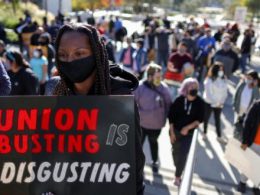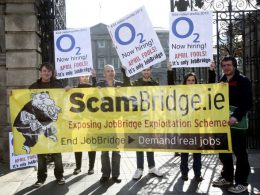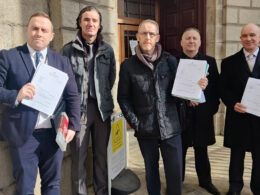By Stephen Boyd
DEFEND OUR JOBS, PAY & CONDITIONS
THE DESPAIR, anger and fear felt by many at the economic catastrophe which is unfolding at an unprecedented speed is reflected in the 120,000 who marched on 21 February, the huge percentages voting in favour of strike action in union after union and the collapse in support for the government.
Working class people are looking for a way out of the crisis. However, they have no faith in the government’s ability to deliver a recovery.
Brian Cowen falsely claims the government has no choice – it must cut public expenditure otherwise the budget deficit will spiral out of control and the national debt will be a major burden for years to come.
The ?6 billion they are taking out of the economy in spending cuts and tax increases will directly translate into tens of thousands of job losses. Brian Cowen’s prediction in the Dail of 450,000 unemployed by the end of this year will be a self-fulfilling prophecy as a result of these policies.
It is madness to deflate an economy in the depths of a recession. Cutting essential public services like health and education, and taking substantial sums of money out of every workers’ pocket in increased taxes and levies means the majority will have less money to spend on food, clothes, white goods, and in local shops and pubs thus causing even more job losses.
The government’s response to the recession will be a disaster for the economy. Its deflationary strategy will drive Ireland towards a 1930s style depression.
Nothing that the government or big business are doing will stimulate new growth in the economy.
The two thirds of workers who earn less than ?40,000, and the 63,000 who signed on the dole in January and February should note that in 2008, the top 1,447 earners had an income of approximately ?3.46 billion!
While the government is cutting your child benefit, or increasing your taxes remember a sizeable proportion of these super-rich either paid no tax or very little, with most paying less that 20%. The top 1% of the wealthiest people in this state have a combined wealth of ?87 billion. It is to these people that the government should look for the funds to plug its fiscal deficit. In 2008, the multinationals that only pay tax at 12.5% exported profits of between ?40 – ?50 billion. Is the government going after this enormous wealth? No! Instead it has increased its subsidy to the rich and the ?7 billion bailout of the banks is the latest instalment.
ICTU’s strategy of getting the government and IBEC to agree to a “social solidarity pact” so that everyone can “share the pain” will not stop unemployment rising to new record levels. Nor will it stop the government and the employers continuing to make the working class pay for this crisis through swingeing cuts in services, wages and social welfare benefits.
The Socialist Party believes that a major campaign should be waged to build the ICTU national strike on the 30 March into the biggest strike that has ever happened in this country.
The call should go out that this national strike is the beginning of a concerted campaign of militant action to force the government to end the cutbacks, halt the tax increases, remove the levies on pay and to instead go after the super-rich and the multinationals. The strike should also be a signal to all employers that the trade unions are going to back workers in a fight to save their jobs and oppose all redundancies.
There is no credible alternative to this rotten government. If Fine Gael and Labour were in power, they would be doing the same things.
Capitalism is failing the majority of people. We need a new political alternative to the right-wing parties and their failed market economy. A mass working class party that unites people in a struggle against the impact of the recession and also offers the alternative of a socialist society to guarantee that everyone shares equally in the wealth of society and provides a decent future for all.
What we need
- A guaranteed job for all or a living income.
- A shorter working week, share out the work with no loss of pay.
- For the socialist nationalisation of all companies threatening closure or redundancies.
- An emergency public development programme to create thousands of jobs.
- For a socialist economic plan to provide for the needs of working people.









